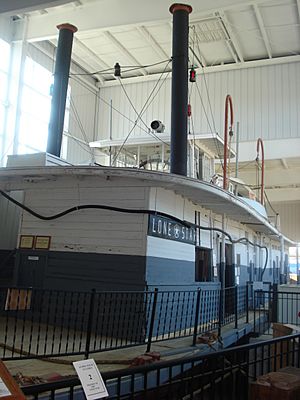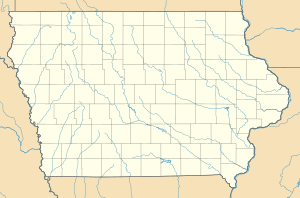Lone Star (towboat) facts for kids
 |
|
| History | |
|---|---|
| Name | Lone Star |
| Launched | 1868 |
| Out of service | 21 April 1968 |
| Status | Museum ship |
| General characteristics | |
| Length |
|
| Beam |
|
| Depth |
|
|
Lone Star (tow boat)
|
|
| Location | LeClaire, Iowa |
| Built | 1868 |
| Architect | Multiple |
| NRHP reference No. | 89002461 |
| Significant dates | |
| Added to NRHP | 20 December 1989 |
| Designated NHL | 20 December 1989 |
The Lone Star is a special old boat in Le Claire, Iowa, United States. It's a towboat that used steam power and had a big paddlewheel at the back. Today, you can see it at the Buffalo Bill Museum in LeClaire.
This boat was built way back in 1868. It's super important because it's the oldest steam-powered towboat that still exists. Plus, it's the only one left that has a wooden body. Because it's so unique, the Lone Star was named a National Historic Landmark in 1989. This means it's a very important historical place in the United States.
What is the Lone Star Like?
The Lone Star has a strong wooden body, called a hull. This hull is about 90 feet (27 m) long. It has a pointed front (bow) and a flat bottom, which helped it move easily in rivers. When you add its big sternwheel (the paddlewheel at the back), the whole boat is about 105 feet (32 m) long.
The boat is about 24.5 feet (7.5 m) wide and its inside is about 4.1 feet (1.2 m) deep. Inside the hull, there's a special strong frame that helped keep the boat together. The hull is also divided into three sealed sections, which helped keep it safe from water.
The Lone Star has two main levels. On the bottom level, you'd find the powerful steam engines and boilers. These were fueled by coal, which was stored at the front. The engines were at the back. On the upper level, there was the pilot house, where the captain steered the boat. This deck also had rooms for the crew.
The Lone Star's Journey Through Time
The Lone Star was built in 1869 in Clinton, Iowa. When it was first made, it was a side-wheeler, meaning it had paddlewheels on its sides. It was used for short trips, carrying people and goods.
In 1890, the boat got a big makeover. It was changed into a stern-wheeler, with one large paddlewheel at the back. This made it perfect for its new job: a towboat. Towboats push or pull other boats, like barges, along the river.
The Lone Star was updated again in 1899 at the Kahlke Boat Yards in Rock Island, Illinois. Then, in 1922, it was changed one more time to help with dredging. Dredging is when you clear out mud and sand from the bottom of a river.
Finally, on April 21, 1968, the Lone Star stopped working. It was the last working wooden paddlewheel boat on the Mississippi River. Today, it's the only one left that is still complete.
Images for kids
 | Delilah Pierce |
 | Gordon Parks |
 | Augusta Savage |
 | Charles Ethan Porter |





